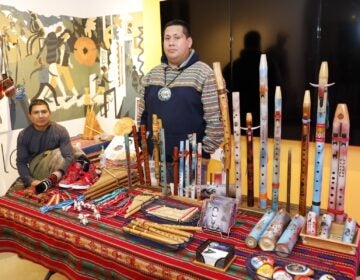A financial boost for Delaware historic sites
First State National Historical Park awards Delaware Division of Historical and Cultural Affairs funds to preserve sites like John Dickinson Plantation in Dover.
This year commemorates the 250th anniversary of John Dickinson’s “Letters from a Farmer in Pennsylvania.” The series of essays were in favor of individual and colonial rights and were written to help the average person understand their rights as a citizen.
It’s a part of Delaware history that people get to experience during a visit to the John Dickinson Plantation in Dover. The attraction is among a few in the state awarded a total of $190,000 in grant money from the First State National Historical Park. Dickinson Plantation will use $45,000 to improve the tour and history interpretation and to preserve some of the structures on the property. The New Castle Court House Museum and Fort Christina National Historic Landmark will receive funds as well. The money will be divided up by Delaware Division of Historical and Cultural Affairs.
According to Gloria Henry, the plantation site supervisor, more than 10,000 visitors tour the historic site each year. Tourists explore the mansion, which was built in 1740. Visitors see where Dickinson lived and hear from interpreters usually dressed in character.
“We have a lot of records here, we have a lot of documents here, and so when we go through them we’re finding things to help fine-tune our interpretation,” Henry said. The museum recently celebrated the 60th anniversary of its 1956 opening.
The theme of Delaware’s national park is different from that of most states. History is the main attraction in Delaware, said Senator Tom Carper, a big supporter of the National Park System.
“For many years, Delaware had no national parks. We were the last state to get a national park, and the theme of our national park is different, but the focus of our national park is early colonial development leading up to the ratification of the constitution,” Carper said.
He said preserving the state’s history is great for the economy.
“As it turns out, part of the nurturing environment for job creation and preservation is having interesting things to do and interesting places to see,” Carper said.
Henry has spent the last 26 years working to make Dickinson’s story a memorable one for tourists. During tours, visitors will also learn about the slaves he owned and his complicated relationship with slavery along with a few other key facts.
“He was a very significant person in our history and establishment of the United States, but he kind of got lost in history because he did not sign the Declaration of Independence. But John Dickinson was a framer and signer of the U.S. Constitution,” Henry said.
Henry said she’s thankful for funds to support the state’s history.
“You are based on history. What you do, what you’ve done, how you grow, how you make friends, how you go through life is based on your history, and so collective history is important to learn and to know and to use to grow further,” she added.
WHYY is your source for fact-based, in-depth journalism and information. As a nonprofit organization, we rely on financial support from readers like you. Please give today.




